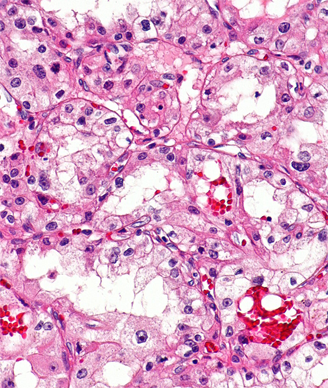Nivolumab Combo Yields PFS Benefit Regardless of PD-L1, c-MET status in RCC
An ongoing exploratory biomarker analysis of the CheckMate 9ER trial set out to identify predictive biomarkers or a composite model of response of nivolumab/cabozantinib efficacy in advanced renal cell carcinoma.
Identifying hallmark gene sets and individual genes predictive of progression-free survival (PFS) outcomes following nivolumab (Opdivo) plus cabozantinib (Cabometyx) for advanced renal cell carcinoma (RCC) will allow for the characterization of the tumor microenvironment and whether its responsive to treatment, according to findings from an exploratory post-hoc analysis of the phase 3 CheckMate 9ER trial (NCT03141177) presented at the 2023 Genitourinary Cancers Symposium.
Hallmark gene sets with higher expression of genes associated with PFS outcomes following nivolumab/cabozantinib vs sunitinib included oxidative phosphorylation, adipogenesis, hypoxia, P53 pathways, and hematologic metabolism.

In particular, investigators reported that PFS benefit appeared to be primarily independent of PD-L1 and c-MET status.
Investigators noted that hallmark gene sets that were identified using gene set enrichment analysis (GSEA) had higher expression of genes associated with PFS outcomes following nivolumab/cabozantinib vs sunitinib (Sutent). This included oxidative phosphorylation, adipogenesis, hypoxia, P53 pathways, and hematologic metabolism.
Moreover, individual genes from select enriched hallmark gene sets were prognostic of PFS, although it was not predictive. Investigators also reported that none of the 7 published gene expression signatures (GES) tested predicted PFS outcomes following treatment with nivolumab/cabozantinib vs sunitinib, according to Cox PH analysis.
Investigators also noted that PFS and OS improved in the nivolumab plus cabozantinib arm vs the sunitinib arm regardless of tumor PD-L1 expression. Although tumor PD-L1 statuses were not associated with PFS outcomes in the nivolumab plus cabozantinib arm, a PD-L1 expression of at least 1% correlated with worse PFS compared with less than 1% within the sunitinib arm.
Investigators of the randomized, open-label phase 3 CheckMate 9ER trial compared nivolumab plus cabozantinib against sunitinib monotherapy in the management of clear cell, advanced, or metastatic RCC. Patients were randomly assigned 1:1 to receive 240 mg of nivolumab intravenously every 2 weeks plus 40 mg of cabozantinib orally once a day or 50 mg of sunitinib orally once a day using a a 4 weeks on, 2 weeks off schedule.
The primary end point was PFS per blinded independent central review based on RECIST v1.1 criteria. Secondary end points included OS, overall response rate based on RECIST v1.1 guidelines, and safety.
The median follow-up for OS was 44.0 months (range, 36.5-56.5).
Biomarker assessments were conducted using pre-treatment tumor specimens. Hallmark gene sets assessed via pre-ranked GSEA by using all genes ranked by interaction effect; PFS estimates were then identified via Cox proportional hazard analysis.
Individual gene expression was examined using likelihood ratio test from Cox proportional hazard models. Additionally, GES and immunohistochemistry were assessed using Kaplan-Meier methods via log-rank test and Cox proportional hazard models with continuous scale data.
There were 640 all-treated patients and 410 who were evaluable for RNA sequencing.
In terms of biomarker assessments, whole transcriptome RNA sequencing was performed in 63% (n = 201/320) of patients in the nivolumab plus cabozantinib arm and 65% (n = 209/320) of patients in the sunitinib arm. In each respective arm, PD-L1 expression was evaluable in 98% and 98% of patients, CD8 T-cell density and topology were evaluable in 64% of patients each, and cytoplasmic and membrane tumor expression was observed in 93% and 95% of patients, respectively.
According to the investigators, demographic characteristics and clinical outcomes were comparable between the all-treated and RNA sequencing-evaluable patient populations.
Overall, the investigators determined that CD8% and CD8 topology did not prognosticate or predict efficacy with nivolumab plus cabozantinib vs sunitinib. Higher CD8% correlated with improvements in PFS with nivolumab plus cabozantinib, but not with sunitinib. Additionally, inflamed CD8 topology correlated with improved PFS (P <.0001) and OS (P = .00097) with nivolumab plus cabozantinib vs sunitinib.
Cox proportional hazard analyses, however, indicated that neither CD8% (overall effect, P = .57; interaction effect, P = .77) nor CD8 topology (overall effect, P = .94; interaction effect; P = .73) significantly correlated with survival outcomes.
Moreover, investigators reported that cytoplasmic c-MET was negatively prognostic for the combination arm, although it was not found to be predictive. Additionally, a Cox proportional hazard analysis using continuous-scale data highlighted a significant association between cytoplasmic c-MET and PFS outcomes regardless of treatment , but not interaction effect. Notably, there was no association between c-MET and PFS outcomes when the treatment arm was taken into consideration.
Additionally, membrane c-MET was neither prognostic nor predictive of outcomes following nivolumab plus cabozantinib treatment vs sunitinib.
Reference
Choueiri TK, Motzer RJ, Powles T, et al. Biomarker analysis from the phase 3 CheckMate 9ER trial of nivolumab + cabozantinib v sunitinib for advanced renal cell carcinoma (aRCC). J Clin Oncol. 2023;41(suppl 6):608. doi:10.1200/JCO.2023.41.6_suppl.608